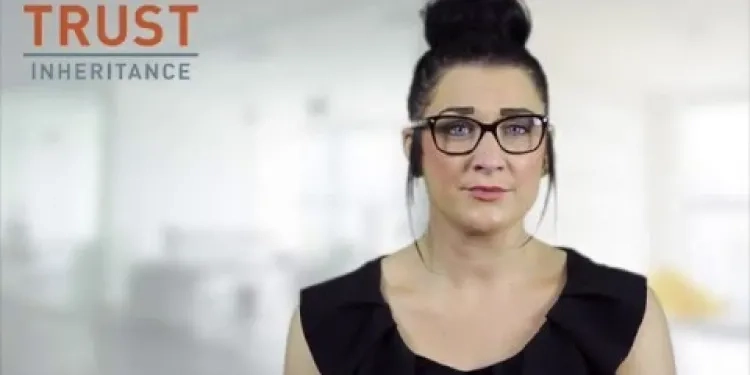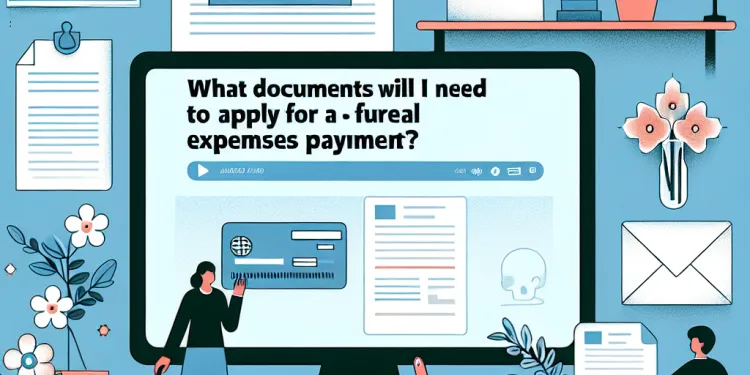Find Help
More Items From Ergsy search
-

Planning for your funeral
Relevance: 100%
-

What is a pre-paid funeral plan?
Relevance: 96%
-

Can funeral directors offer payment plans?
Relevance: 88%
-

Planning Your Funeral in Advance? | Expert Tips from Celebrants
Relevance: 81%
-

What Do You Want for Your Own Funeral? | Personal Funeral Wishes Explored
Relevance: 68%
-

Can I arrange a funeral service myself without a funeral director?
Relevance: 67%
-

How to arrange a funeral in the UK
Relevance: 64%
-

What is a green or eco-friendly funeral?
Relevance: 64%
-

What is the average cost of a funeral in the UK?
Relevance: 63%
-

Does life insurance cover funeral costs?
Relevance: 63%
-

What support is available for funeral costs in the UK?
Relevance: 63%
-

What is the first step in arranging a funeral in the UK?
Relevance: 62%
-

How do I choose a funeral director?
Relevance: 62%
-

What is the role of a funeral director in a traditional burial?
Relevance: 61%
-

Who is eligible for a Funeral Expenses Payment?
Relevance: 61%
-

Funeral Costs - Where to get help? - Community Legal Education
Relevance: 61%
-

What financial support is available for funeral expenses?
Relevance: 61%
-

What costs are usually associated with a funeral?
Relevance: 61%
-

How much does a funeral typically cost in the UK?
Relevance: 60%
-

Can I get a loan to cover funeral costs?
Relevance: 60%
-

Can I have a funeral service at home?
Relevance: 59%
-

How do I apply for a Funeral Expenses Payment?
Relevance: 58%
-

Are there any charities that can help with funeral costs?
Relevance: 58%
-

What is a public health funeral?
Relevance: 58%
-

What financial help is available for funeral costs?
Relevance: 58%
-

How soon after the funeral can the cremation take place?
Relevance: 57%
-

What are the different types of funerals available?
Relevance: 55%
-

Do I need to have a wake or reception after the funeral?
Relevance: 55%
-

How do I notify people about the funeral?
Relevance: 55%
-

What documents will I need to apply for a Funeral Expenses Payment?
Relevance: 54%
-

Can I use crowdfunding to raise money for funeral expenses?
Relevance: 53%
-

Are there regulations on transporting the body before the funeral?
Relevance: 53%
-

How much can I receive from the Funeral Expenses Payment?
Relevance: 51%
-

Can I have a funeral ceremony at a woodland burial site?
Relevance: 51%
-

How can I personalise a funeral service?
Relevance: 50%
-

Student Finance: Should I pay more? | Plan 1 & Plan 2 | SF Explained
Relevance: 40%
-

Does bereavement leave cover funerals for cultures or religions with extended mourning periods?
Relevance: 39%
-

Planned caesarean section
Relevance: 39%
-

What is an asthma action plan?
Relevance: 38%
-

What is an income-driven repayment plan?
Relevance: 38%
In the UK, planning your own funeral has become an increasingly popular and practical choice. It offers several advantages, allowing individuals to ensure their final wishes are carried out while alleviating the emotional and financial burden on their loved ones.
How to start planning for your own funeral.
To start, you can engage with a funeral director who can guide you through the process. Key considerations include selecting between burial or cremation, choosing a casket or urn, and deciding on the service details such as location, music, and readings. Additionally, you can set aside funds to cover the expenses or explore prepaid funeral plans. Planning your own funeral in the UK provides peace of mind and a thoughtful way to support your family during a challenging time.
- Why should I plan my own funeral?: Planning your own funeral allows you to ensure your final wishes are honored and eases the burden on your loved ones.
- When should I start planning my funeral?: You can start planning at any age, but it's a good idea to do it when you're healthy and sound of mind.
- Do I need a professional funeral director to plan my funeral?: It's not mandatory, but funeral directors can provide valuable guidance and assistance.
- What are the first steps in planning a funeral?: Initiate a conversation with a trusted friend or family member to discuss your preferences.
- How do I choose between burial and cremation?: Consider your personal beliefs, environmental concerns, and budget when making this decision.
- Can I specify the type of casket or urn I want?: Yes, you can choose the style and material that aligns with your preferences.
- What details should I consider when planning the service?: Think about location, religious or secular aspects, music, readings, and any special rituals.
- Do I need to prepay for my funeral expenses?: Prepayment is optional, but it can help alleviate financial stress for your family.
- What happens if my wishes aren't documented?: Without clear instructions, your family may face difficult decisions and potential disagreements.
- Can I personalize my funeral service?: Absolutely! You can include personal items, anecdotes, and specific requests to make it unique.
- Who should I inform about my funeral plans?: Share your plans with a trusted family member or friend, and ensure they have access to the necessary documents.
- Can I change my funeral plans later?: Yes, you can update your plans as your preferences evolve.
- Should I involve my lawyer in the planning process?: While not required, legal advice can be helpful, especially for estate planning.
- What happens to my prepaid funds if the funeral home goes out of business?: Check if the funds are protected or transferable to another provider.
- Can I donate my body or organs for medical research or transplantation?: Yes, you can, but this requires separate arrangements and consent.
- How can I ensure my funeral wishes are legally binding?: Consult with legal experts to draft a legally binding document, like a funeral directive or will.
- Should I consider eco-friendly funeral options?: If environmental concerns are important to you, explore eco-friendly burial or cremation alternatives.
- What happens if I pass away while traveling or living abroad?: Make sure your loved ones are aware of your plans and have access to necessary documents, even if you're far from home.
- Can I involve my loved ones in the planning process?: Absolutely! Collaborating with family and friends can help ensure your funeral reflects your life and values.
Planning for Your Funeral in the United Kingdom
Why Plan Ahead?
Planning your funeral in advance may not be a pleasant task, but it is a responsible and thoughtful gesture to make things easier for your loved ones during a difficult time. By planning ahead, you can ensure your wishes are met while also alleviating the burden of decision-making and financial expenses from your family.
Choosing a Funeral Plan
In the UK, there are various types of funeral plans available to suit different preferences and budgets. You can opt for a pre-paid funeral plan, which lets you pay in advance for services like burial or cremation, or an insurance-based plan, which covers costs upon your passing. It’s essential to carefully review what each plan includes and decide which one meets your needs and provides peace of mind.
Legal Considerations
When planning your funeral, it’s advisable to document your preferences in a legally recognized form, such as a will. This helps ensure that your wishes are respected. You may also consider appointing a legal representative or an executor to oversee the arrangements. Additionally, it’s beneficial to communicate your plans to your family members so they are aware of your desires.
Personalising Your Service
Funeral services can be a reflection of your life and personality. When planning, consider elements such as readings, music, and tributes that are meaningful to you. You can also specify the type of service, whether it is religious or non-religious, and other personal touches like the venue and dress code. These details help make the service a fitting farewell.
Managing Costs
Funeral costs in the UK can vary widely, so it’s important to budget accurately. Basic services such as the coffin, burial or cremation fees, and the funeral director’s fees typically form the core expenses. You may also want to set aside funds for additional elements like flowers, catering, and transportation. Carefully comparing different service providers and plans can help manage these costs effectively.
Support and Resources
Various resources and organisations offer support and guidance for funeral planning in the UK. The National Association of Funeral Directors (NAFD) and the Funeral Planning Authority (FPA) provide valuable information and ensure that standards are upheld. Consulting these resources can provide further clarity and support as you navigate the planning process.
In the UK, planning your own funeral is becoming more common. It is a smart idea because you can make sure everything is done the way you want. It also helps your family by making things easier and less expensive for them.
How to start planning for your own funeral
To start planning, talk to a funeral director. They can help you. You will need to decide if you want to be buried or cremated, choose a casket or urn, and think about the service details like where it will be, what music to play, and what readings to have. You can also save money now to pay for it or look into prepaid funeral plans. Planning your own funeral gives you peace of mind and helps your family during a tough time.
- Why should I plan my own funeral?: By planning your own funeral, you can make sure your last wishes are respected and reduce stress for your family.
- When should I start planning my funeral?: You can start anytime, but it's good to plan when you are healthy and able to make decisions.
- Do I need a professional funeral director to plan my funeral?: You don't have to, but they can be very helpful in the process.
- What are the first steps in planning a funeral?: Talk with someone you trust about what you would like for your funeral.
- How do I choose between burial and cremation?: Think about what feels right for you, including your beliefs and budget.
- Can I specify the type of casket or urn I want?: Yes, you can choose the style and material that you like best.
- What details should I consider when planning the service?: Consider things like the place, special rituals, music, and readings.
- Do I need to prepay for my funeral expenses?: It's not required, but prepaying can make it easier financially for your family.
- What happens if my wishes aren't documented?: Without clear instructions, your family might find it hard to know what you wanted and could disagree.
- Can I personalize my funeral service?: Yes, you can make it special with personal items and stories.
- Who should I inform about my funeral plans?: Share your plans with someone you trust and make sure they know where your important documents are.
- Can I change my funeral plans later?: Yes, you can adjust your plans as needed.
- Should I involve my lawyer in the planning process?: It can be helpful, especially for making sure legal matters are in order.
- What happens to my prepaid funds if the funeral home goes out of business?: Make sure to check if your funds are safe or can be moved to another provider.
- Can I donate my body or organs for medical research or transplantation?: Yes, but you need to set this up separately and give your consent.
- How can I ensure my funeral wishes are legally binding?: Talk to a legal expert about making a document that states your wishes clearly.
- Should I consider eco-friendly funeral options?: If you care about the environment, look into options like green burials or cremations.
- What happens if I pass away while traveling or living abroad?: Make sure your loved ones have your plans and important papers, even if you're far away.
- Can I involve my loved ones in the planning process?: Yes, working together can make sure your funeral reflects who you are.
Planning for Your Funeral in the United Kingdom
Why Plan Ahead?
Planning your funeral ahead of time is not fun, but it helps your family when they are sad. By planning, you make sure things are done your way and it helps your family with money and making decisions.
Choosing a Funeral Plan
In the UK, you can choose different funeral plans based on what you like and how much money you have. You can pay now for a plan that covers things like burial or cremation. Another type of plan uses insurance to pay for costs when you pass away. It is important to look at what each plan offers and pick the one that is best for you.
Legal Considerations
It is a good idea to write down what you want in a legal document, like a will, so people follow your wishes. You might want to have someone you trust in charge to make sure everything goes as planned. Talk to your family about your plans so they know what you want.
Personalising Your Service
Your funeral can show who you are. Think about having readings, music, or tributes that you like. You can say if you want a religious or non-religious service, and pick the place and how people dress. These choices make your funeral special to you.
Managing Costs
Funerals can cost a lot in the UK, so plan your budget well. Costs usually include the coffin, burial or cremation, and funeral director's fees. You might also want to pay for flowers, food, and transport. Compare different services and plans to find options that fit your budget.
Support and Resources
There are places that can help you with planning. The National Association of Funeral Directors (NAFD) and the Funeral Planning Authority (FPA) have useful information. They make sure everything is done properly. Checking these resources can help you understand and feel supported while planning.
Frequently Asked Questions
Why should I plan my funeral in advance?
Planning your funeral in advance can help relieve your family from financial and emotional stress during a difficult time. It also allows you to ensure that your wishes are clearly communicated and followed.
How do I start planning my funeral?
Begin by deciding on the type of service you want, choosing a funeral director, and considering the costs involved. It's also important to document your wishes and inform your family about your plans.
What are the different types of funerals available in the UK?
In the UK, you can have a traditional burial, cremation, woodland or green burial, or direct cremation. Each option has its own set of considerations and costs.
What are the costs involved in planning a funeral?
The cost of a funeral can vary widely depending on factors such as the type of service, the choice of burial or cremation, and additional services like flowers, transportation, and catering.
Can I prepay for my funeral?
Yes, many funeral directors offer prepaid funeral plans, which allow you to pay for your funeral in advance and lock in current prices, potentially saving money and reducing financial burden on your family.
What should I include in my funeral plan?
Your funeral plan should include your choice of burial or cremation, details about the service, any specific readings or music you want, and preferences for the wake or reception. Also, include any personal touches you would like.
How do I choose a funeral director?
Look for a certified and reputable funeral director with good reviews. It may also help to seek recommendations from friends or family. Ensure they understand and respect your wishes.
Can my family make changes to my funeral plan after I'm gone?
Although your family will generally try to follow your wishes, they may make changes if necessary, such as due to budget constraints or if a specific request becomes impractical.
What is a green or eco-friendly funeral?
A green or eco-friendly funeral minimizes environmental impact by using biodegradable materials, avoiding embalming fluids, and opting for natural burial sites like woodland areas.
Do I need a will to plan my funeral?
Having a will is not mandatory for planning a funeral, but it is advisable as it provides a legal document to outline your wishes, including your funeral plans, and can help prevent disputes among your family members.
How can I ensure my family knows about my funeral wishes?
Discuss your funeral wishes with your family and provide them with a written document detailing your plans. You might also include these details in your will or an advance care directive.
What is a direct cremation?
A direct cremation is a no-frills option where the deceased is cremated without a traditional funeral service or ceremony beforehand. It is usually more affordable and allows the family to arrange a separate memorial service if they wish.
Can I be buried on private land?
Yes, in the UK, it is legal to be buried on private land, such as a family estate or garden, but you need to ensure that you follow local environmental regulations and planning permissions.
What is the role of a celebrant in a funeral?
A celebrant is a professional who officiates at funerals. They can help create and lead a personalized service that reflects the beliefs, values, and wishes of the deceased and their family, whether religious or non-religious.
How do I update my funeral plan if my wishes change?
If your wishes change, update your written funeral plan and inform your family and funeral director as soon as possible. Make sure the updated plan is stored in a place where your family can easily find it.
Why should I plan my funeral early?
Planning your funeral early can help your family. Here are some reasons why:
- Make it easier: Your family doesn't have to make tough choices during a sad time.
- Save money: You can choose what you want and make sure it fits a budget.
- Your wishes: You can decide how you want your funeral to be, so it feels right for you.
- Reduce stress: Your family will already know your plans, which makes things simpler.
Try using pictures, lists, or asking for help from a friend to make planning easier.
Planning your funeral before you pass away can help your family. It stops them from worrying about money and feelings when they are sad. It also makes sure that what you want happens.
How do I plan my funeral?
Here are some easy steps to help you:
- Talk to your family and friends. Let them know what you want.
- Write down your ideas. You can make a list of what is important to you.
- Think about money. How much can you spend?
- Pick a place. Do you want it at a church, a park, or another location?
- Choose music and readings. What songs or stories do you like?
If you need help, you can:
- Ask a helper to write or read for you.
- Use pictures to show your ideas.
First, think about what kind of service you want. Pick a person to help with the funeral, called a funeral director. Think about how much money it might cost. Write down what you want and tell your family about your plans.
It can help to talk to a friend or use pictures to make it clearer. You can also ask someone to help you when you read or write your plans.
What kinds of funerals can you have in the UK?
When someone dies, families can choose different ways to say goodbye. These are called funerals. In the UK, there are different kinds you can choose from.
- Burial: This is when the person is placed in a coffin and buried in the ground.
- Cremation: This is when the person is turned into ashes. The family can keep the ashes or scatter them in a special place.
- Woodland Burial: This is a natural way to bury someone in a peaceful place with lots of trees.
It can help to talk to someone about these choices. You can also use pictures or videos to understand better. Asking questions is always a good idea.
In the UK, there are different ways to lay someone to rest. You can choose:
- A traditional burial,
- A cremation,
- A woodland or green burial,
- A direct cremation.
Each choice has different things to think about and costs different amounts of money.
Tools like talking to funeral planners or using checklists can help you decide what's best.
How much does it cost to plan a funeral?
Planning a funeral costs money. Here are some things you might pay for:
- Paying to use a place for the funeral service.
- Buying a casket or urn for the body.
- Getting flowers to decorate the funeral.
- Printing programs or cards for the service.
- Paying for a car to take people to the funeral.
It can be helpful to ask someone you trust for help. You can also use a calculator to help keep track of the costs.
The price of a funeral can be different. It depends on what you choose. You can pick a burial or a cremation. Other things like flowers, cars, and food can also change the price.
Can I pay for my funeral before I die?
Yes, many funeral directors let you pay for your funeral before you die. This is called a prepaid funeral plan. You pay now, so your family does not have to pay later. It can also save money because you pay today's prices, even if things cost more in the future.
What should I put in my plan for my funeral?
A funeral plan is a list of what you want to happen when you die. It helps your family know what to do.
Here are things you can put in your plan:
- Your wishes: Write down what you want for your funeral.
- People to call: List the people you want your family to call.
- Your special things: Say what should happen to your things like clothes, jewelry, or special items.
- Your favorite songs: Add any songs you want at the funeral.
- Your pictures: Choose some pictures to show at the funeral.
Getting help can make this easier:
- Ask your family to help you write your plan.
- You can use pictures to show what you want.
- Talk with someone you trust, like a friend or a helper.
When you plan your funeral, think about some important choices:
- Do you want to be buried or cremated?
- What kind of service do you want? For example, who will talk, and where will it be?
- Is there any special music or readings you like?
- What do you want for the gathering after the service, like a wake or reception?
- Add any personal things you like to make it special.
Remember, you can use tools like pictures or voice notes to help share your ideas. You can also ask someone you trust to help you plan.
How do I choose someone to help with a funeral?
Choosing the right person to help with a funeral is important. Here are some steps to help you:
- Ask for help: Talk to friends or family who have planned a funeral before. They might know someone good.
- Look online: Search the internet for funeral helpers in your area.
- Read reviews: Find out what other people say about them.
- Visit them: Go meet the person and see if they are kind and helpful.
- Ask questions: It's okay to ask about the cost and what they will do.
It's important to feel comfortable with the person you choose.
If reading is hard, you can use a reading app to help you understand this information better.
Find a funeral director with a certificate and good reviews. Ask friends or family for advice. Make sure they listen to what you want.
Can my family change my funeral plan after I die?
When you die, your family may want to change your funeral plan. They might need to change it because things are different, or they can't do what you wanted.
If your plan lets them change things, then they can. If not, they may have to follow your wishes. It's a good idea to talk to your family about what you want.
Your family can use tools like a lawyer or funeral director for help. It's important to write down what you want, so it's clear for everyone.
Your family will usually try to do what you want. But sometimes they might have to change things. This could happen if there is not enough money or if your request is too difficult to do.
What is a green or eco-friendly funeral?
A green funeral is a special kind of funeral that is good for the Earth. It helps take care of nature.
Green funerals use simple and natural things. They try not to hurt the planet.
Here is how green funerals help the Earth:
- Use less chemicals that can harm the Earth.
- Bury people in nature-friendly ways.
- Use things that are easy to break down in the ground, like wooden caskets.
- Use fewer machines that make smoke and pollution.
If you want to learn more, you can:
- Watch videos about green funerals.
- Ask someone to explain it to you.
- Look for pictures and easy books about green funerals.
An eco-friendly funeral is kind to the Earth. It uses things that break down easily, doesn’t use chemicals to keep the body from changing, and happens in natural places like forests.
Do I need a will to plan my funeral?
Do you need a will to plan your funeral?
A will is a piece of paper that tells people what you want when you die.
No, you do not need a will to plan your funeral. You can plan your funeral without one.
Here are some things that can help you:
- Write down what you want for your funeral.
- Talk to family or friends about your wishes.
- You can see a funeral planner to help you.
These things make sure your wishes are known.
You don't have to have a will to plan a funeral, but it's a good idea. A will is a legal paper where you can write down what you want, like your plans for the funeral. This helps make sure everyone knows what you want and can stop any arguments in your family.
If you find writing a will difficult, you can get help from a friend, family member, or a lawyer. You can also use tools like computer programs or online forms to help you write your will.
How can I make sure my family knows what I want for my funeral?
It is important to tell your family what you want for your funeral. Here are some easy steps you can follow:
- Talk with your family. Tell them what you want.
- Write down your wishes. Keep it in a safe place.
- You can ask a friend or family member to help you write it down.
- Use simple words to say what you want.
- Check every year to see if you want to make changes.
Tools that can help:
- Ask someone you trust to help you talk or write about your wishes.
- Use pictures or drawings to show what you want.
Talk to your family about what you want for your funeral. Write down your plans. You can also put these details in your will or a special document about your care wishes.
What is a direct cremation?
A direct cremation is when a person who has died is taken straight to the crematorium without a funeral service. It is simple and usually costs less money.
If you want help understanding, you can ask someone you trust to explain it to you. You can also use pictures or videos to learn more.
A direct cremation is a simple way to say goodbye. The person who died is cremated, but there is no big funeral service first. It usually costs less money. The family can still have a special gathering later to remember their loved one if they want.
Can I be buried in my own garden?
Yes, you can be buried in your own garden or on private land. But there are rules you need to follow. Here are some steps that might help:
- Talk to your local council. They can tell you the rules in your area.
- Tell the person who owns the land. They need to know and agree.
- Get a map. Draw where you want the grave to be. Keep it safe.
- Make sure the grave is far from water sources like rivers or wells. This keeps the water clean.
- Ask for help. Talk to a lawyer or an expert if you're not sure.
You can also use tools online. They can show you more information and help you understand better.
Yes, in the UK, you can be buried on private land like a family garden. You must check and follow local rules and get the right permissions.
What does a celebrant do at a funeral?
A celebrant helps during a funeral. They guide the ceremony and make it special. They talk about the person who has died and share nice memories. The celebrant helps everyone say goodbye.
If you find reading hard, try using a ruler or your finger to follow along. Take your time and ask someone if you need help understanding.
A celebrant is a person who leads a funeral. They can help make a special service that shows what the person who died and their family believe and want. This can be a religious service or not.
How do I change my funeral plan if I want something different?
If you change your mind about your funeral, you can update your plan.
Steps to update your plan:
- Contact the company that has your funeral plan.
- Tell them what changes you want to make.
- Ask if there are any fees for changing your plan.
It’s good to write down what you want. You can ask a family member or a friend to help you. You can also use a computer or a phone app to keep track of your wishes.
If you change your mind, update your funeral plan. Tell your family and the funeral director right away. Keep the new plan in a place where your family can find it easily.
Useful Links
This website offers general information and is not a substitute for professional advice.
Always seek guidance from qualified professionals.
If you have any medical concerns or need urgent help, contact a healthcare professional or emergency services immediately.
Some of this content was generated with AI assistance. We’ve done our best to keep it accurate, helpful, and human-friendly.
- Ergsy carfully checks the information in the videos we provide here.
- Videos shown by Youtube after a video has completed, have NOT been reviewed by ERGSY.
- To view, click the arrow in centre of video.
- Most of the videos you find here will have subtitles and/or closed captions available.
- You may need to turn these on, and choose your preferred language.
- Go to the video you'd like to watch.
- If closed captions (CC) are available, settings will be visible on the bottom right of the video player.
- To turn on Captions, click settings .
- To turn off Captions, click settings again.
More Items From Ergsy search
-

Planning for your funeral
Relevance: 100%
-

What is a pre-paid funeral plan?
Relevance: 96%
-

Can funeral directors offer payment plans?
Relevance: 88%
-

Planning Your Funeral in Advance? | Expert Tips from Celebrants
Relevance: 81%
-

What Do You Want for Your Own Funeral? | Personal Funeral Wishes Explored
Relevance: 68%
-

Can I arrange a funeral service myself without a funeral director?
Relevance: 67%
-

How to arrange a funeral in the UK
Relevance: 64%
-

What is a green or eco-friendly funeral?
Relevance: 64%
-

What is the average cost of a funeral in the UK?
Relevance: 63%
-

Does life insurance cover funeral costs?
Relevance: 63%
-

What support is available for funeral costs in the UK?
Relevance: 63%
-

What is the first step in arranging a funeral in the UK?
Relevance: 62%
-

How do I choose a funeral director?
Relevance: 62%
-

What is the role of a funeral director in a traditional burial?
Relevance: 61%
-

Who is eligible for a Funeral Expenses Payment?
Relevance: 61%
-

Funeral Costs - Where to get help? - Community Legal Education
Relevance: 61%
-

What financial support is available for funeral expenses?
Relevance: 61%
-

What costs are usually associated with a funeral?
Relevance: 61%
-

How much does a funeral typically cost in the UK?
Relevance: 60%
-

Can I get a loan to cover funeral costs?
Relevance: 60%
-

Can I have a funeral service at home?
Relevance: 59%
-

How do I apply for a Funeral Expenses Payment?
Relevance: 58%
-

Are there any charities that can help with funeral costs?
Relevance: 58%
-

What is a public health funeral?
Relevance: 58%
-

What financial help is available for funeral costs?
Relevance: 58%
-

How soon after the funeral can the cremation take place?
Relevance: 57%
-

What are the different types of funerals available?
Relevance: 55%
-

Do I need to have a wake or reception after the funeral?
Relevance: 55%
-

How do I notify people about the funeral?
Relevance: 55%
-

What documents will I need to apply for a Funeral Expenses Payment?
Relevance: 54%
-

Can I use crowdfunding to raise money for funeral expenses?
Relevance: 53%
-

Are there regulations on transporting the body before the funeral?
Relevance: 53%
-

How much can I receive from the Funeral Expenses Payment?
Relevance: 51%
-

Can I have a funeral ceremony at a woodland burial site?
Relevance: 51%
-

How can I personalise a funeral service?
Relevance: 50%
-

Student Finance: Should I pay more? | Plan 1 & Plan 2 | SF Explained
Relevance: 40%
-

Does bereavement leave cover funerals for cultures or religions with extended mourning periods?
Relevance: 39%
-

Planned caesarean section
Relevance: 39%
-

What is an asthma action plan?
Relevance: 38%
-

What is an income-driven repayment plan?
Relevance: 38%


